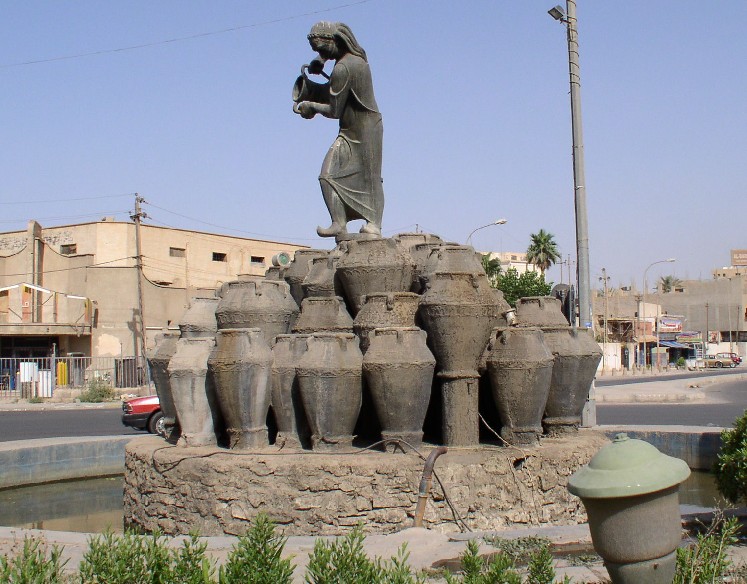Some years back while I was in Iraq, an Iraqi woman, serious and intent, seeking an equally serious and intent response, asked me, “What kind of people are you?”
Somehow I knew what would come next, but she explained to make sure I took her meaning: “What kind of people are you that you send your
children here to die? Who does that? What kind of people
are you?”, her voice rising with each word.
Years later I sit in a borrowed vacation home in Scotland, in one of the most peaceful and safe places perhaps on the entire planet. Surrounded by beauty and safety, I read novels set in war times. I don’t know why I do it – this self-inflicted wounding, for that’s what it is.
Sometimes I simply seek understanding through art. But for all the beauty of the well-told story, they all, whether standing on the side of peace or war . . . they all slide down the slope of inevitability – the biggest lie of all.
And I am sick of it – heart sick and soul weary of this lie we humans proclaim as if it were wisdom, as if it were true: the lie that war and violence are inevitable.
For here’s the thing: that something has been done and has been done often does not make it inevitable.
We are the inevitable piece.
Our participation is what creates the reality.
We choose, and in our choosing, determine whether lions and lambs will or will not co-exist in peace or move on towards destruction.
In the book
Resistance by Welsh poet Owen Sheers, a woman of the country whose husband disappears into the night to fight with the resistance cries out in her heart against the notion that Tom had gone to defend his country: “She
was his country and she was in need.” Tom chose and in the choosing of one thing, abandoned another.
And now I read
Remembrance about WWI. Among the characters is a young man who fervently believes not in pacifism, but in his own certainty that the so-called war to end all wars is wrong – foolish, wasteful, and wrong in its aims and objectives. And yet he too goes after a period of some resistance. He goes because the very things he believes are true strike his own family. He goes to die because others he loves have died – not out of revenge or any change of heart about the rightness of the ‘cause’, but because some internal sense of honor tells him that because these have died so too must he.
It is the worst, the most pernicious, kind of lie, this lie in our fiction as well as in our fact, that a social decision to war has a claim of inevitability upon our hearts, against which we can do nothing but acquiesce.
And it is an outrage.
It is the outrage of the broken widow women at their sinks, the same women who applauded the sending of their sons as well as husbands, to the killing fields. Do we really so lack in imagination that we can little foresee that what happens to other sons and daughters will happen to ours? When the telegram comes, how dare we be surprised? And yet we are and continue to be – deluded, surprised, taken aback by the horrors we so carefully orchestrate that it can hardly be other than thus.
I read and I remember the diaries of my Grandfather from World War I and his two sisters from World War II, particularly the writings of my great aunt Lucy. I remember her blithe tales of her times in North Africa and Italy, of sun-bathing picnics with officers and teas, dinners and dancing, and I am staggered with the anger I feel towards her.
How dare you, Aunt Lucy? How dare you lie so even in your own private diaries? Even when she writes to herself, all she speaks of are light-hearted things, as if she were on her own Grand Tour of Europe.
Here’s the thing:
if, and it should (although seldom is) always be the biggest of all ifs – if we are to head to war,
ever, then should it not only be after the gravest consideration by us all of the great cost to ourselves
and to the others, even and perhaps
especially our enemies? Should not those who have been there before recite with the most somber of tones the enormity of what is to be encountered? Should we speak not of parades and parties and shining uniforms, but of dirt and grime and death and killing, of those who will never come home and of those who will – but never the same?
How could my ever-so-brave great aunt leave only a legacy of lies? How could she do that to us who came after? How could she not see? Or if she did see, how could she not tell, even herself?
I read and ponder and I walk this ancient land pockmarked with memorials not to the dead, but to their wars. The one thus far leaving me most puzzled, most troubled, most amused, is perhaps also the most telling of such things:
Near Girvan, in the village of Lendalfoot, along the shore of the Irish Sea, stands a bulky iron anchor monstrosity of a monument, with commemorative words written mostly in Russian – yes, Russian. What little English there is tells of the life of a Russian ship named Varyag, hailed as a “a symbol of courage and heroism of Russian seamen all over the world.”
Girvan online
The Russian cruiser was blockaded in 1904 by the Japanese at a Korean port. Refusing to surrender, a battle ensued, the ship was damaged, and her Russian crew scuttled her and escaped back to Russia. The ship was raised by the Japanese in 1905 and renamed Soya. In 1916, Russia bought her back and she was renamed Varyag. In 1917, she was sent to Great Britain for repair, but (here’s my favorite part – saying so little, it says so much), “. . . because of the revolution and civil war in Russia, the legendary ship was set adrift.” No explanation is offered as to just who set her adrift (I’m guessing the British) or why (I’m guessing they were on the side of the Czar, who was losing the fight). Again without explanation, it is noted that in 1920 (what happened during the 3 years she was ‘set adrift’?), Varyag was sold for scrap to Germany (sold by whom, one is left to wonder). And let us note that within less than two years of the end of World War I, someone (I’m guessing Great Britain) is selling off the parts of war ships to the Germans, in what would have to have been a stretch of thinking to be legal under the terms of the Treaty of Versailles, which allowed the German nation only six naval ships. Again, I’m guessing that the rationale went something like this:
these are spare parts and the treaty says nothing about parts, after all. But not to fear: on the way to Germany for dismantling, Varyag grounded and then sank near Lendalfoot. And almost 90 years later, a monument is erected to the ship and her crews by the Russians on Scottish soil.
There it is; I’ve seen it with my own eyes: a monument to something rather different than the courage of the seamen who manned her 80+ years ago, I’d say. Rather than a monument to the seamen of an obscure confrontation in an all-but-forgotten page of history, this monument stands as a wonderful articulation of the history of war and conflict: the Russians and the Japanese fight over a Korean port, each taking from the other and from the foreign soil they invade with their claims, and decades later, one side dares to call that venture epic and heroic. I wonder how the Koreans tell the story? Years pass and the armament in the form of a ship is bought back by one side from the other in the previous conflict. Years pass and a third party refuses to repair the ship because of the shifting political tides within the country which owns her. Rather than repair her, they set her adrift and then reclaim her to sell her for parts. It’s such an elegant traipse around the law of the sea, isn’t it? And of course, her parts are sold by one old enemy to another, with both turning blind eyes to the treaty that would make such a transaction illegal.
And to celebrate all this wonderful history of back-stabbing, war, treachery, and business as usual in the midst of it all, all sides get together and build a monument to it, without the least sign or recognition of irony.
God, how I hate this planet some days.
Siegfried Sassoon, Suicide in the Trenches (1917)
I knew a simple soldier boy
Who grinned at life in empty joy,
Slept soundly through the lonesome dark,
And whistled early with the lark.
In winter trenches, cowed and glum,
With crumps and lice and lack of rum,
He put a bullet through his brain.
No one spoke of him again.
You smug-faced crowds with kindling eye
Who cheer when soldier lads march by,
Sneak home and pray you'll never know
The hell where youth and laughter go.
The Iraqi woman’s question still begs to be answered: what kind of people are we that we would send our young to die in such a place, in such a way, cheering as they go?











































